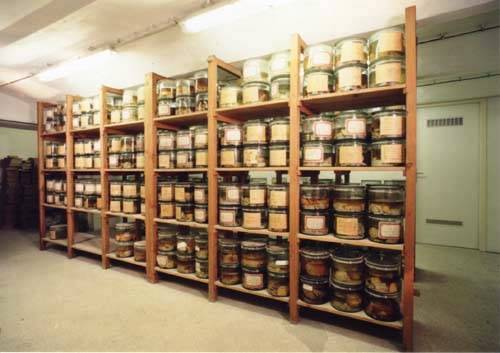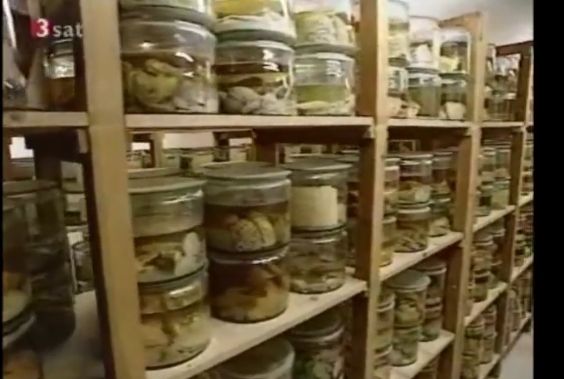
The brains of those who died are still kept in preservation jars in the hospital's basement. Dr Gross is believed to have continued experimenting on them until recently.
He was allowed to keep the body parts of many of the children in a private collection.
Despite several attempts to prosecute him, Dr Gross has largely escaped scrutiny. In 1951 he was acquitted of a single manslaughter charge.
After the war he entered the Social Democratic party and later became one of the country's leading neurologists. Work carried out on the body parts of his victims earned him an honorary cross.
Until last year he was the second best-paid forensic doctor working in the legal system.
But in 1997, in the light of evidence uncovered by the Documentation Archive of Austrian Resistance - including papers released from the archives of former East Germany's secret police, the Stasi - the parliamentary investigation was launched.

Forensic scientists at Innsbruck university spent two years studying the collection of brains.
Despite fears that the passage of more than 50 years would have destroyed any evidence, nine of the brains - of children between 10 days and 14 years old - showed traces of poison, indicating that they had died from unnatural causes.
According to the charge, Dr Gross took part in the euthanasia of mentally and physically disabled children. 'The deaths were a consequence of the administration of unknown amounts of the sleeping tablets Luminal and Veronal, which led to a reduction in their ability to breathe and to the development of fatal pneumonia.'
Dr Gross denies the charges.
When the case comes to court later this year, witnesses will include former staff and patients at the hospital.
Alois Kaufmann was admitted to Spiegelgrund in 1943, aged 10, suffering from syphilis. He says he is "deeply satisfied" that Dr Gross is due to stand trial.
He said: "I still have nightmares about the things I saw there They split children's brains open with drills when they were fully conscious, they dunked my head in freezing water until I turned blue, just to see how long I could endure it, they took all the bed clothes away and put the children on the balcony in the freezing cold until they got pneumonia and died."
Mr Kaufmann, 65, is now a retired social worker living in Vienna. "I've been waiting for 55 years for justice to be done."
"I think they were hoping that I would die so that it could all be forgotten about," he said. "And I don't care about bringing an 85-year-old to court. Did he give a damn how old his victims were when he picked them out?"
Patients' 'ailments', he said, included bed-wetting, illegitimacy, harelips and cleft palates, all conditions that earned children the label 'unworthy to live'.
Mr Kaufmann said he could vividly remember Dr Gross doing his morning rounds dressed in the brown Nazi uniform.
"He used to give sweets to the pretty children and often the next day the children would have disappeared. That was how warped he was.
"I remember my friend Karl - one day he was healthy and we were playing, the next day I saw a nurse pushing his dead body in a wheelbarrow, his blue arms and legs dangling down as if he was a turkey."
Mr Kaufmann said he believed he survived the hospital because of his 'Aryan looks'.
Years later he spotted the doctor on television talking about electro-shock treatment. 'I said to my wife, 'That was the swine who was involved in selecting which of us would die'.'
Last year, for the first time, Mr Kaufmann won recognition from the state as a victim of war and started receiving a special pension.
He is also having therapy. "I still have nightmares, claustrophobia, agoraphobia and sometimes I wake up screaming," he said.
Dr Gross's lawyer, Nikolaus Lehner, said his client, who lives with his daughter close to the site of Spiegelgrund, was 'shattered' by the news of the trial.
"His health has taken a blow," he said. "But I think if these things that are alleged to have happened are correct, then that is quite horrific."
Wolfgang Neugebauer, of the documentation archive, said the trial would be the first war crimes trial in Austria for more than 25 years.
"I am not surprised that Dr Gross was able to escape prosecution for so many years," Dr Neugebauer said. "It was easy to do in a society where there are many people against this sort of thing who are still coming to light.
"I'm pleasantly surprised that this is finally happening, and it is a sign that younger politicians are finally replacing the old status quo."
Since you’re here …
… we have a small favour to ask. More people are reading the Guardian than ever but advertising revenues across the media are falling fast. And unlike many news organisations, we haven’t put up a paywall – we want to keep our journalism as open as we can. So you can see why we need to ask for your help. The Guardian’s independent, investigative journalism takes a lot of time, money and hard work to produce. But we do it because we believe our perspective matters – because it might well be your perspective, too.
I appreciate there not being a paywall: it is more democratic for the media to be available for all and not a commodity to be purchased by a few. I’m happy to make a contribution so others with less means still have access to information.Thomasine F-R.
If everyone who reads our reporting, who likes it, helps fund it, our future would be much more secure. For as little as £1, you can support the Guardian. Thank you.
Πηγή: https://www.theguardian.com/world/1999/apr/26/kateconnolly

